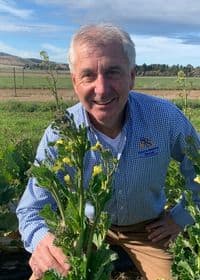When we think of the role honey bees play in broader Australian agriculture, we typically think of key pollination dependent industries such as almonds, blueberries and avocados.
But did you know that pollination also plays a critical role in the production of seeds?
Craig Garland is a production manager for South Pacific Seeds, one of the key industry partners for Plan Bee, Australia’s national honey bee genetic improvement program.
According to Craig, pollination is absolutely critical for the seed production industry.
“Approximately 80% of seeds produced by South Pacific Seeds in Australia involve insect pollination and honey bees are a significant part of the insect pollination that we use. Our customers rely on us to provide out-of-season production options and the ability to spread the risk of seed production over many locations.”
Craig says that with the recent varroa outbreak, and increasing weather volatility, it’s important that the entire food production industry understands the role that improved genetics can play in the productivity and profitability of Australian agriculture, and ultimately our food security.









